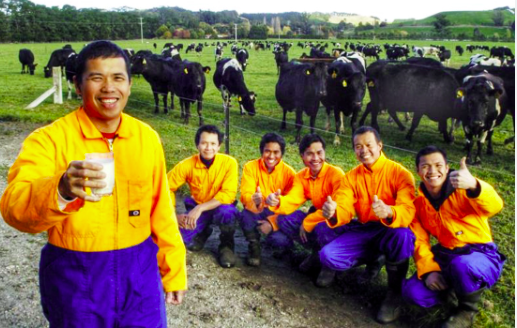Dairy Farm Workers For Taiwan
A new labor scheme aimed at encouraging domestic workers to work on Taiwan’s dairy farms has gained support from Taiwanese farmers. Many Taiwanese are reluctant to work on dairy farms due to the dangers of big animals, but a growing ageing population is contributing to the labor shortage. Taiwan has one of the lowest fertility rates in the world and, by 2065, will surpass Japan in the proportion of retired people to working-age residents. As a result, 10% of Taiwanese farms have regular labor shortages, which increase during times of high demand.
Dairy farm workers
Dairy farm workers are in high demand in Taiwan, a country that is experiencing a manpower shortage in the industry. This shortage has been attributed to two major factors. First, the local population is hesitant to take up the work of milking cows due to their fear of large animals. Second, Taiwan’s ageing population is adding to the shortage. Its fertility rate is among the lowest in the world, and by 2065, Taiwan is expected to surpass Japan in the ratio of old to young residents. By that time, there will be one working age Taiwanese for every retiree. In addition, 10 percent of Taiwan’s farms experience labor shortages regularly, and the problem increases during periods of high demand.

The shortage of labor in Taiwan’s dairy industry has led the government to introduce a new policy that allows dairy farms to hire foreign workers on trial basis. According to the new law, a dairy farm must employ at least four local farm workers and must pay at least NT$28000 a month in wages.
The Ministry of Labor in Taiwan hopes that the new program will help farm owners and workers alike. The government has already started the process of verifying employment contracts. However, until the employment contracts are finalized, no dairy farm workers have yet come to Taiwan. Taiwan is a labor-intensive country.
Taiwan’s dairy farmers’ association was founded on 21 September 1994 and now represents over 570 dairy farms. The association’s mission is to promote cooperation among dairy farmers, guarantee legal benefits to their workers, and build a sustainable environment for the dairy industry. It also collects product information, monitors government plans, and facilitates communication among its members.

The Ministry of Labor has also approved a proposal that will increase the number of migrant agricultural workers in Taiwan. The move will allow more migrant workers to enter Taiwan’s agricultural sector and help alleviate labor shortages. It is important to note that this new policy does not include plans to reduce tariffs or improve agricultural conditions in Taiwan.
Migrant domestic workers
There has been a recent wave of coronavirus infections among Taiwan’s low-wage migrant workers. According to the Ministry of Labour, more than half of these workers never take a day off, and they often have to work around the clock without any kind of leave or breaks.
Taiwan’s current immigration policy has placed these workers under the complete control of their employers, meaning that they have limited bargaining power against their employers. The current policy only allows migrant blue-collar workers to work in the country legally for a period of 12 years, and domestic migrant workers are allowed a maximum stay of 14 years.
As of April 2021, the Ministry of Labour reports that there are 378,772 migrant women working in Taiwan, making up 53% of the migrant workforce. However, the Ministry does not break down these statistics by industry. This is likely due to historical cultural practices that require women to take on a care-giving role.

While the International Labour Organization has been in place since 1951, Taiwan has failed to incorporate migrant domestic workers in its Labour Standards Act or National Health Insurance. The absence of such frameworks for migrant domestic workers in Taiwan’s policy system makes the situation of migrant domestic workers very bleak. This is because of the lack of middle-level institutions, which could more easily enforce regulations and check on employers. As a result, there is little hope for change in the migrant domestic workers’ situation in Taiwan.
Although Taiwan has a negative perception of migrant workers, its economy is booming. The country is one of the leading global hubs of semiconductor production, and migrant workers play an important role in this success. While the country has a shortage of skilled labor, migrant workers have an advantage. These workers can also help Taiwan’s elderly population and are essential to the country’s high-technology industry.
Despite the challenges faced by migrant workers, Taiwan’s government is trying to address these problems. While formal socioeconomic protection for migrant workers is limited, the government has been implementing programs to improve their socio-cultural welfare and working conditions.
Migrant farm workers in Taiwan’s agricultural sector
Migrant farm workers in Taiwan’s agriculture sector are an increasingly common sight. As Taiwan’s population continues to age, labor shortages are increasing. The Council of Agriculture recently increased the number of migrant workers allowed into the country. This includes those who work in aquaculture, vegetable cultivation, and livestock farming.
Taiwan’s distant-water fishing fleet also employs migrant workers. They are recruited from overseas and are paid a recruitment fee before joining the fleet. They are often subject to debt contracts and are often not paid the wages they were promised. As a result, Taiwan’s migrant farm workers face a variety of dangers while working in this industry.
Dairy Farm Workers For Taiwan
Taiwan’s agricultural industry is a global leader in agritourism and vertical farming. It was also the home of Koxinga, a 17th-century king who imported 43 kinds of vegetables from South China. Today, Taiwan has more than three million cultivated acres.
As a result, some farm workers are burdened with growing debts to the stores run by the companies that employ them. Company stores are notorious for inflating prices and force workers to buy provisions on credit. Their ability to leave the farm is also limited. This is not sustainable for workers.
Children forced to work on farms are often not paid a decent wage. They work long hours and overtime, often without adequate food. Some are also threatened with physical abuse for trying to escape. Moreover, many children are required to work in dangerous conditions and are denied enough sleep.
Migrant farm workers’ scepticism about the rights and benefits of migrant workers
Human Rights Watch interviewed 160 farmworkers in eight states and Taiwan, and found that migrant farm workers were highly sceptical of their rights and benefits. They noted that certain groups of workers were especially vulnerable, including girls and young women, indigenous workers, and recent immigrants. While these groups are typically more reluctant to talk about abuse, nearly all reported some type of sexual violence.
In Georgia, Monica worked in sanitation and was injured while at work. She was treated at the company clinic, but continued to bleed. She was later fired by the company, which demanded she produce good papers. Although she had been working for three years, she was not entitled to benefits because she did not have legal documents.

The study found that only 39 percent of farmworkers were eligible for unemployment insurance and only 50 percent were eligible for workers’ compensation. Furthermore, only 21 percent of farmworkers were living in housing provided by their employers. Many of them cannot afford to lose their jobs, and many of them do not have many other options.
Despite the laws enforcing migrant workers’ rights, unauthorized farmworkers may be unable to report workplace abuses, and may have little chance of obtaining legal status. Although US law recognizes the rights and benefits of migrant workers, labor enforcement agencies argue that the law should be broadly applied to protect all workers.
Many migrant farm workers in Taiwan were also sceptical about their rights, and wished they could return home to live with their families. Because of their circumstances, they could no longer return home. This made them unable to access legal assistance and unable to participate in collective negotiations. Consequently, they were often denied the rights and benefits of national workers.



